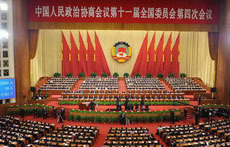Boosting the private sector
By Xiao Gang (China Daily)
Updated: 2011-02-12 07:31
Non-government businesses have picked up development speed but need continuous financial and policy support
Editor's notes: The All-China Federation of Industry and Commerce recently published a report on the development conditions of China's private sector, their status in the national economy and their development prospects. The following is from the report.
China maintained stable and relatively rapid economic development in 2010, despite some severe tests caused by the global economic slowdown and a number of natural disasters. This was in part due to the rapid development of the private sector.
China's private economy has doubled over the past five years, both in terms of its development scale and its overall strength.
According to data released by the State Administration of Industry and Commerce, China's registered private enterprises increased from 4.3 million in the early period of the 11th Five-Year Plan (2006-2010) to more than 8.4 million at the end of 2010, with an average annual growth rate of 14.3 percent and a total growth rate of 95 percent during the five years. Private companies now account for 74 percent of China's enterprises. The total registered funds of the private sector surpassed 19 trillion yuan ($2.89 trillion) by the end of 2010, with an average growth rate of 20.1 percent year-on-year and an accumulated growth rate of more than 150 percent over the past five years.
China's Statistical Annals show that the scale of private sector investment has also risen remarkably. The total fixed township investment by domestic private companies exceeded 12 trillion yuan by the end of 2010, with an average growth rate of 34.5 percent year-on-year over the past five years. Total profits yielded by privately run industrial enterprises grew to 967.8 billion yuan in 2009, compared with 212.1 billion yuan in 2005.
A number of private enterprises have made full use of their advantage in funds and talent to increase research over the past five years in a bid to develop some core technologies and push forward transformation and upgrading of traditional technologies and products. They have also shifted from manufacturing and processing into biological medicine, new energy, new-generation information technology and other new strategic fields.
Statistics from China's Statistical Annals indicate that the total expenditure on scientific research by domestic large and medium-sized private enterprises was 32.18 billion yuan in 2009, an increase of 21.65 billion yuan over 2006. The annual average growth rate was 45.1 percent. The number of patents secured in 2009 by domestic large and medium-sized private enterprises was 9,064, up from 4,451 in 2006, and the average growth rate was 25.3 percent.
In addition to its fast development, the private sector has also made an ever-growing contribution to national revenues. According to statistics released by the State Administration of Taxation, privately owned businesses realized a total revenue of 1.12 trillion yuan in 2010, increasing 22.2 percent year-on-year over the past five years.
The private sector has also played a growing role in boosting and expanding employment. The total number of people employed in China's private sector exceeded 180 million by the end of 2010, 60 million more than at the end of 2005.
The 12th Five-Year Plan period (2011-2015) is crucial for the country to transform its national development model and sustain fast and environmentally friendly growth. The private sector will be at the forefront of sustainable economy and green production.
To promote faster development of the private sector, government departments should be aware of its importance to China's endeavor to transform the development mode and guarantee people's livelihoods and should extend it more practical policies and support. For example, more effective measures should be taken to accelerate the entry of private companies into the country's monopoly industries and build a financial service system suitable for private enterprises, especially small businesses.
The country should also try to accelerate implementation of a national strategy to develop high-caliber talent for the non-public economy.
(China Daily 02/12/2011 page5)



